






















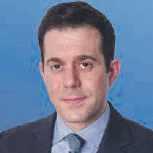























































































TICKET £25
Jonathan Sacerdoti is a British broadcaster and journalist, regularly appearing on major networks to comment on politics, culture, and antisemitism, with expertise in Middle Eastern affairs.



Leo Pearlman is a CoCeo of Fulwell Entertainment and Executive Producer of Emmy award winning We Will Dance Again
Natasha Hausdorff is Legal Director of the UKFLI Charitable Trust, An association of lawyers who support Israel and seek to ensure that the rights of Israel and Israelis are respected.
Jake Wallis Simons is a journalist , former editor of the Jewish Chronicle and author of Israelophobia.
Chaired by: Daniel Greenberg CB is a lawyer who currently serves as parliamentary commissioner for standards.














Foreign Secretary insists recognition will go ahead this month, even with their loved ones still held in Gaza


David Lammy has revealed he held a “deeply moving” meeting with the families of UK-linked Gaza hostages, where he attempted to reject criticism that recognition of a Palestinian state will reward Hamas, writes Lee Harpin.
The foreign secretary told Jewish News that those present at Tuesday’s meeting included Moshe Or, whose brother Avinatan is “still being cruelly held in captivity in the Gaza Strip”.
“It was a deeply moving reminder of the unbearable pain they have
su ered,” added Lammy, who confirmed that the talks had included discussion on why the government had chosen to announce it would pursue its path of Palestinian recognition at the UN General Assembly meeting later this month.
On Monday, he told MPs the con-
troversial move would still go ahead at a meeting in New York, beginning on 23 September, unless the Israeli government took “substantive steps” to end the appalling situation in Gaza and commit to a long-term sustainable peace.
Continued on page 2
Continued from page 1
The plan has been strongly criticised by Jewish communal organisations, and also by Benjamin Netanyahu, who claimed it was “rewarding Hamas” while the hostages, around 20 of whom are still believed to be alive, are held in Gaza.
“I assured the families that our commitment to securing the release of the remaining hostages is resolute,” Lammy said.
“We will continue to work tirelessly to end this nightmare and ensure Hamas can never again inflict such terror on innocent people. The hostages must come home. We will not rest until they do.”
A statement released by representatives of the hostage family members described the meeting with the foreign secretary as “not an easy one for us”, though it was “hugely important that the British state continues to hear the voices of the hostages and hostage families”.
They said Lammy “gave us a straight answer to a question officials in our previous meetings had avoided, namely whether it is possible the UK could recognise a Palestinian state if hostages were still held by Hamas. He answered: ‘Yes’.”
In barely veiled criticism of the government, the statement continued: “It is clear what pres -
sure it is placing on Israel. It is not clear what pressure, if any, the UK is placing on Hamas to release the hostages. What additional sanctions... are being imposed on Hamas or its funders and supporters? Why have no conditions been placed on Hamas in relation to recognition?”
The foreign secretary told Jewish News: “Our intention to recognise a state of Palestine is not about rewarding Hamas. It’s about protecting the two-state solution’s viability at a critical moment. This is essential to Israel’s long-term security and regional position.”
Praising the hostage families’ “incredible strength”, Lammy said: “Hamas is a brutal terrorist organisation and bears full responsibility for the appalling atrocity on 7 October 2023, and for the continued suffering of the hostages in Gaza.


“Our demands on Hamas are unconditional and absolute. Commit to a ceasefire, now. Release the hostages, now. Disarm, now. End your governance of Gaza, now. We will not hand Hamas any veto or role in the future of a Palestinian state. This is a matter of principle.
“Hamas do not represent the Palestinian people. We will never recognise them as a governing entity.”
The statement from hostage family members said: “These are
The home secretary has confirmed the UK is taking “immediate action” to rescue children seriously injured in the “horrendous onslaught on civilians” in Gaza.
Addressing the Commons on the government’s asylum plans, Yvette Cooper also confirmed the Home Office has activated systems to issue expedited visas, with biometric checks conducted before arrival for children and “their immediate accompanying family members”.
Cooper said the government had taken similar steps to ensure that Gazan students on fully funded scholarships for places at UK universities could start their studies here this autumn.
The announcement on Gaza came after Cooper confirmed the government

would temporarily suspend new refugee family reunion applications in an “overhaul” of the asylum system.
Downing Street has previously refused to give a “running commentary” on steps being taken to bring sick Gazan children to the UK.
Cooper also added: “Later this year, we will set out plans to establish a permanent framework for refugee students to come study in the UK,
so we can help more talented young people fleeing war and persecution to find a better future alongside capped and managed ways for refugees to work here in the UK.”
Cooper said the Government will use “legal and controlled support” to help people fleeing persecution, stating: “We will continue to do our bit to support Ukraine, extending the Ukraine permission extension scheme by a further 24 months, with further details to be set out in due course.”
On efforts to close asylum hotels, Cooper said the Government is reconfiguring sites, tightening tests for accommodation and working “at pace” to identify more appropriate accommodation, as well as working on clearing the backlog.
fine words, but we want to see action. The UK must apply more pressure on Hamas, including on those countries that continue to work with Hamas, to get all of the hostages freed.
“We want to see sanctions, arrest warrants and other punitive measures. We hope to be making this demand to others in power in the UK in the coming days. Tomorrow may be too late. The UK must act now.”
Benjamin Netanyahu rejected backing a partial hostage deal with Hamas at a meeting of the government’s security cabinet, despite IDF Chief of Staff Eyal Zamir backing negotiations.
During a six-hour gathering, the prospect of a hostage deal did not feature on the agenda, with ministers instead asked to discuss the IDF’s preparations to take control of Gaza City and a response to the intentions of various countries, including the UK, to recognise a Palestinian state later this month.
Zamir’s attempt to push negotiations towards a hostage deal was given short shrift by Netanyahu, who reportedly said the framework to which Hamas had agreed was irrelevant and not on the table.
The Hostages and Missing Families Forum responded to leaked detail of the meeting saying: “Netanyahu is sacrificing the hostages and soldiers on the altar of his political survival.”
Meanwhile, Hamas spokesperson Abu Obeida was killed in an aerial attack in Gaza City. Israel’s military said the spokesperson had been behind the release of videos showing hostages, as well as footage of the Hamas-led attack that sparked the war. Defence Minsiter Israel Katz described Abu Obeida as having been “sent to meet all the eliminated members of the axis of evil...at the bottom of hell.”
Jeremy Corbyn’s brother has shared a notorious white supremacist antisemitic conspiracy theory on social media, days after stating that he had joined his sibling’s new political grouping.
Piers Corbyn, best known for climate change and Covid-19 vaccine denial, told an interviewer in late August that he would be joining “Your Party”, the new political group formed by Jeremy Corbyn and Zarah Sultana.
On Monday Piers Corbyn shared an antisemitic conspiracy theory known as the Kalergi Plan, attributed to a political thinker named Richard Coudenhove Kalergi.
The he shared included the incorrect claim that Kalergi was “Jewish”, and attributed a false quote to him, which read: “We intend to turn

Europe and North America into a mixed mongrel race of Asians and Negros ruled over by Jews”.
The graphic shared by Piers Corbyn also included a supposed 11-point plan “to subvert Western civilisation”, including “teaching of sex and homosexuality to children” and “huge immigration to destroy identity”. Alongside the graphic, Piers Corbyn had written “Everything
in the Kalergi plan is being attempted now. Resist! Defy! Do Not Comply!”
In early 2021, leaflets connected to Piers Corbyn were distributed in London, which compared the Covid-19 vaccine to the Holocaust. When queried about his use of this comparison, Piers Corbyn defended himself by saying:
“I was married for 22 years to a Jewess and obviously her mother’s forebears fled the Baltic states just before the war because of Hitler or the Nazis in general. I’ve worked with Jewish leading world scientists over the last 30 years. I’ve also employed Jewish people in my business Weather Action, one of whom was a superb worker.”
Both Jeremy Corbyn and Zarah Sultana have been contacted for comment.

Police have arrested a man after a Jewish woman was hospitalised following an e-scooter attack in north east London, in which the alleged assailant reportedly shouted “f***ing Jew”, writes Michelle Rosenberg. The incident happened on Monday on Clapton Common, Hackney. Footage released by local Shomrim showed the assailant ram-

ming a 21-year-old lady, later admitted to hospital with a fractured arm, bruised leg and facial scar.
Moments later, a 24-year-old woman, who was with her three-yearold daughter, was knocked down. Shomrim tracked the suspect until police made an arrest. The Met police told Jewish News : “Sheriff Rufai, 47 of

Clapton Common, E5” had been charged with assault by beating in relation to a female child... actual bodily harm in relation to a woman... racially/reli-
The International Association of Genocide Scholars has been condemned for a controversial declaration that Israel is committing genocide in Gaza, with a member of the body stating: “the process was a disaster from start to finish.”
The IAGS voted to recognise Israel’s conduct in Gaza as a genocide – though almost three quarters of its 500 person membership did not vote. The Association’s President described the resolution as “a definitive statement from experts in the field of genocide studies that what is going on on the ground in Gaza is genocide”.

However, Dr Sarah Brown, a member of the IAGS, said: “I have been a member… for over a decade and can confirm the process was a disaster from start to finish. Those of us against the resolution tried to submit our concerns for discussion but were blocked by
the leadership.
“We were promised a town hall, which is a common practice for controversial resolutions, but the president of the association reversed that. The association has also refused to disclose who were the authors of the resolution.”
Dr Brown described the resolution as “incorrect in its assessment of Israel’s conduct in Gaza. It includes many unsubstantiated claims, is poorly cited... and perpetuates intentionally distorted analyses of the Israel Hamas War... Anyone who considers themself a genocide scholar should feel embarrassed by this vote.”
Sadiq Khan has voiced his opposition to the staging of a major arms fair in London later this month which he says is “inappropriate” given Israel’s ongoing military action in Gaza.
The London mayor had previously written to organisers of the DSEI event at the capital’s ExCel to remind them that the capital is home to thousands of people who have fled conflict and su ered as a result of weapons like those exhibited at this event.
Last week it emerged that
the UK had prevented an Israeli government delegation from attending DSEI UK 2025 in response to the decision to further escalate its military operation in Gaza.
Despite the ban, Israeli defence firms will still be allowed to exhibit at the trade show, which will take place from 9 to 12 September.
A spokesman for Khan said: “The mayor is completely opposed to this event taking place in London and is appalled that the capital is being used as a marketplace
for those who wish to trade in weapons.
“The mayor has previously written to both the organisers and ExCel to remind them that London is home to thousands of people who have fled conflict and su ered as a result of weapons like those exhibited at this event – and continues to urge them to reconsider hosting the fair in London in the future.”
The spokesman added that the event was ‘inappropriate given Israel’s ongoing military operation in Gaza’.
Zack Polanski – who previously said he is “proud to be Jewish” but is “certainly not a Zionist” – has been elected leader of the Green Party.
The vegan London Assembly member beat joint candidates Adrian Ramsay and Ellie Chowns, winning a commanding victory of 20,411 votes, versus 3,705 votes for his opponents.
Mothin Ali, the Leeds councillor who hailed the “end of white settler colonialism” on 7 October, was elected deputy leader, the party confirmed.
giously aggravated intentional harassment/alarm/ distress in relation to a woman... affray; driving an e-scooter dangerously and driving without insurance.”
Rufai was remanded in custody to appear at Wood Green Crown Court on Tuesday 30 September.

On the day of the attack, Ali wrote on X: “White supremacist European settler colonialism must end.”
In his acceptance speech, Polanski claimed the Greens would now “replace” the Labour government, which he accused of supporting “the genocide in Gaza”.
Born David Paulden in Salford, Greater Manchester, Polanski changed his name at 18. He was a Liberal Demo-

crat activist before switching to the Green Party. Having previously criticised Corbyn and supported the IHRA definition of antisemitism, Polanski has reversed course on both. An incident that has dogged him took place in 2013 when a journalist for The Sun who posed as a client wrote that Polanski, then working as a hypnotherapist at a London Harley Street practice, claimed to be able to boost her bust size through hypnotherapy.
Polanski has apologised for the experiment, which he said he did not charge for and claimed he was misrepresented by the newspaper.




By leaving a Future Gift to Jewish Care in your Will, you’ll be doing something beyond incredible. Future Giving ensures that vulnerable older people in our community are supported, even beyond your lifetime.

To find out more about Future Giving or our free Will-writing service visit jewishcare.org/futuregiving or scan the QR code

“At the moment, our story seems to be told by others. This project is about Jews telling their story in their own words.” With that aim, Stephen Smith and his wife, Heather, are launching a storytelling initiative they believe will reshape how Jewish identity is recorded and understood, writes Annabel Sinclair.
The couple, best known for pioneering the first interactive Holocaust survivor holograms, are now focusing on the everyday lives of Israelis. Last month the National Library of Israel signed a Memorandum of Understanding with Our Jewish Story, the organisation the pair co-founded, to house 1,000 interactive video testimonies. Recorded through a bilingual app powered by conversational AI, the archive will allow users not just to watch interviews but engage with them, asking questions and receiving authentic answers from pre-recorded material.
The technology is carefully designed to pull from genuine video segments while maintaining strict verification standards. Each testimony is encrypted, watermarked, and signed off by the participant. “It’s story first, supported by technology,” says Smith. Heather adds:
“When I can ask my own question, I feel more connected. That’s when the story lives in my psyche.”
The project’s first phase, titled Our Israel Story, is focused on capturing the breadth of Israeli society.
“We want a more refined and personal understanding of who Israelis are,” Smith explains. “People talk about Israel in the abstract, but who are Israelis? Where do they come from? What are their journeys?”
The range of voices already included highlights that diversity. One striking testimony is from Ruth Solomon, who began life in Kashmir and only reached Israel in her sixties after a family history marked by loss and survival. Another comes from Sheikh Abas, a Muslim leader from Akko, whose reflections on Israel and its complexities Smith describes as “profound”. The archive will also include accounts from Druze, Christians, Baha’is and migrant workers whose daily lives are lived in Hebrew. Smith recalls watching a group of Southeast Asian domestic workers chatting over coffee in Jerusalem. “The only language they had in common was Hebrew,” he says. “These are the kinds of stories people don’t expect, but they are part of the fabric of Israel.”

To build the first 1,000 interviews, Our Jewish Story is working with institutions across Israel. BenGurion University will host a digital storytelling course, while Kibbutz Lohamei HaGeta’ot will serve as a northern hub. The project is only partially funded, but Smith insists this is just the beginning, and that “the archive itself will ultimately be tens of thousands of interviews.”
The app, set for public launch on 1 January, will initially function in Hebrew and English, with Arabic, Russian, Spanish, French, and German to follow. Users worldwide
will be able to access the stories free of charge, while schools, synagogues, and community institutions will be invited to create their own channels by subscription, allowing them to collect and curate local stories.
In America, the iCentre, a major Israel education provider, will begin curating the project’s content into lesson plans for schools and camps.
For Heather Smith, the roots of the initiative lie in her earlier work with Holocaust survivors. She recalls how Q&A sessions after lectures always left audiences frustrated when time ran out. “What
if you give people the opportunity to have that experience, but for as long as they want to?” she asks. That insight became the basis for conversational video technology: creating the sense of a personal exchange while ensuring only genuine, unaltered testimony is presented. “Every single one of us is shaped by the generations before us,” she says. “We wanted these conversations to continue and be authentic to the individual who lived that experience.” Integration into the National Library of Israel is key to the project’s credibility and preservation. Once catalogued, testimonies will appear alongside the library’s books, photographs, and archives, available for researchers worldwide. “Preserving it like this makes it part of the story of the Jewish people,” Smith says. The long-term ambition is global. Communities from London to Latin America will eventually be able to open their own channels, ensuring that Jewish life in all its variety is documented. As Smith puts it: “What we’re building is a global platform by which Jews can be heard for who they are, not what they are perceived to be.”
Visit ourjewishstory.org
The BBC’s chief international correspondent, Lyse Doucet, has admitted she has “no hesitation in taking the side of innocent people on both sides” covering the war between Israel and Hamas in Gaza, writes Lee Harpin.
As she defended the BBC against accusations of bias, “from all sides” over its coverage of the conflict, the 66-year-old journalist cited the hostages held by Hamas, and the children of Gaza as being among the innocents caught up in a war sparked by the 7 October attacks.

Speaking at an event to promote the publication of her first book, The Finest Hotel in Kabul, the BBC News and Radio 4 presenter was also asked by a member of the audience if she thought the UK “would take stronger action against Russia than it is against Israel” over claims of a famine in Ukraine versus claims of one in Gaza.
“Everyone wants you to take a side, and it becomes a defining identity if you like,” Doucet said, of her many years covering conflicts worldwide, reflecting that “all sides accuse the BBC of taking sides.
“The BBC, the national broadcaster – you want them to be like you, to express what you think is right, or just.”
She stressed: “I have no hesitation in taking the side of the people. Whether one war after another, it’s the same. The children in Gaza, the hostages held by Hamas. There is nothing wrong with taking the side of innocent people.”
Doucet said she believed that “for a while” when leaders discussed Ukraine, “they spoke in different terms about attacks which killed civilians” than they had about attacks which killed civilians in Gaza.
But she added, “But I think that has started to change – a famine is a famine, is a famine”. She defended the reputation of the UN-backed IPC, but noted Israel denies famine allegations.
Reflecting on the ethos at the BBC, for whom she was first based in Kabul from late 1988 to the end of 1989 to cover the Soviet troop withdrawal and its aftermath, the Canadianborn journalist said: “Even though we may not reach that gold standard, it is still drilled into staff that they need to be impartial.”
Keir Starmer is “delighted” to have appointed the ex-president of Columbia University as his new chief economic advisor because of her world-class experience, Downing Street has said, adding she had made clear she abhorred the antisemitism that flared on campus during her time in the United States, writes Lee Harpin.
Shafik, who holds dual British-American citizenship, is a former Bank of England deputy governor and became the first female president of Columbia University in 2023,’ However, her tenure was overshadowed by pro-Palestine activism in the aftermath of the 7 October Hamas terror attacks, withclashes on campus and rising incidents of antisemitism against Jewish students.
In July Columbia, one of America’s top educational institutions, agreed to pay $221m to settle claims by US President Donald Trump’s administration that it failed to police antisemitism on campus.
Shafik, who also previously served as president of the London School of Economics, repeatedly denounced antisemitism while in the role, and announced the formation of a university task force on antisemitism.
During a Congressional hearing last year, Shafik was accused of allowing the university

to become “a hotbed of antisemitism and hatred”. But she also faced the wrath of proPalestine activists and some staff and students for calling in the police to dismantle the occupation of university facilities. Resigning after just over a year, Shafik acknowledged her time at Columbia had been riven by “a period of turmoil where it has been difficult to overcome divergent views across our community”.
A Downing Street spokesperson said Shafik had been appointed because of her 30 years of experience in public service, both as an economist, and in academia.
“What’s very clear is her exceptional economic experience – the PM is delighted to have someone like her on his team,” Keir Starmer’s spokesperson said.
Asked about the sizable payment made by the university in relation to antisemitism claims, the No.10 spokesperson added:”I point you to her letter to the university, at the time she made it clear there was no place for antisemitism anywhere.”
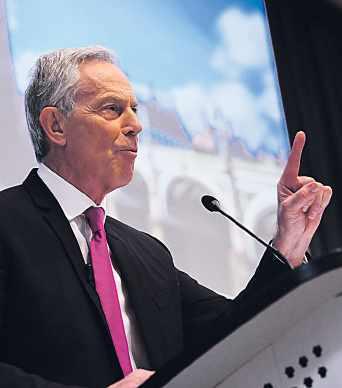
Sir Tony Blair has joined US President Donald Trump in a White House meeting to discuss the future of Gaza, writes Joy Falk.
The former prime minister, who served as a Middle East envoy after leaving No. 10 in 2007, took part in discussions about plans for the region when the war with Israel ends, the BBC reported.
According to The Daily Telegraph, a senior US o cial said Blair briefed Trump on ideas to rebuild the territory.
He is believed to have been working with Trump’s son-in-law, Jared Kushner.
The meeting did not appear on the president’s public schedule, but US Middle East envoy Steve Witko told Fox News Trump would chair the meeting to discuss “a very comprehensive plan”.
Witko did not provide further details on the get-together, but told Fox he believed the conflict could be ended “certainly before the end of this year”.
The US State Department said secretary of state Marco Rubio rea rmed the US’s “unwavering commitment to Israel’s security” when he met Israeli foreign minister
Gideon Saar in Washington. A statement said: “The secretary and foreign minister Saar agreed that continued close cooperation between their countries is vital to the security and prosperity of the region.”
The meetings came as Pope Leo XIV called during his weekly general audience for a permanent ceasefire and “safe entry of humanitarian aid” in Gaza.
Israel’s military has told people remaining in Gaza City to prepare to leave, saying in a social media statement on X evacuation of the city was “inevitable”.
Activists opposing the proscription of Palestine Action intend to hold another mass event expressing backing for the terrorist group, with more than 1,000 people expected to risk arrest this weekend by holding signs showing support for the recently banned organisation, writes Daniel Sugarman.
Defend Our Juries, an organisation which describes itself as “defend[ing] the right to a fair trial” and campaigns against judges “pre-
venting juries from fulfilling their proper role”, has been at the forefront of a campaign to lift the ban on Palestine Action.
Senior Defend Our Juries members were arrested in the early hours of Tuesday, ahead of a planned event where the group was due to announce a static protest on Saturday 6 September in Parliament Square.
At a protest last month organised by the group, more than 500 people were arrested
after holding up signs which expressed support for Palestine Action. Defend Our Juries claims that more than 1,000 people have signed up to express similar support at this Saturday’s event. Key opponents of the ban on Palestine Action include the prominent Irish author Sally Rooney, who has previously publicly expressed her support for the banned group, although she has not risked arrest by doing so in the UK.

A spokesperson for Defend Our Juries described the arrest of its key spokespeople as “scandalous”, “an unprecedented assault on free speech”, and “political repression”. They confirmed their intention to try and overwhelm the police with strength of numbers, saying: “A law so unjust and facing such widespread opposition across the political spectrum, is impossible to enforce and the government will be forced to abandon it.”




Jo Rosenfelder and Adam Taub saw Jewish pupils leaving school with major knowledge gaps. Their solution was the Etgar plan, writes Annabel Sinclair
When Jo Rosenfelder looks back to when her own children were in Jewish primary schools, she recalls something beyond the warmth of assemblies and the buzz of playground chatter. What stood out most for her, she says, were the things pupils weren’t learning.
“We were really worried about their Jewish knowledge,” she tells Jewish News. “Lovely schools, and most Jewish kids were going to Jewish schools, but almost ubiquitously, very, very significant gaps in quite a lot of areas of Jewish knowledge.”
She and co-founder Adam Taub noticed that while children were enthusiastic, their grasp of basics like Jewish history, the calendar, the story of Israel or the difference between Torah and Talmud was shaky. “Fundamental building blocks of Jewish life and Jewish knowledge hadn’t been covered,” Rosenfelder explains. “That omission affects them as they’re growing up. It makes them feel very lost, Jewishly… there are great dangers in neglecting the teaching of educational foundations.”
of the moon. We said, if the moon looks like this, what festival could be starting tonight? The kids are really engaging. With the multiple-choice questions, we test higher-order thinking. We also set several creative tasks, allowing pupils to display their learning in different ways.”

For Rosenfelder, the real goal is to equip pupils with a language that will carry them through life. “It’s like the times tables. You can’t do much maths if you don’t know your times tables. The same thing with Jewish general knowledge – if you don’t know what certain words mean, how Jewish history has developed or stories from the Torah, you could get lost very quickly.”
Older teenagers, she notes, are often too embarrassed to admit what they don’t know. “For a student of 13 or 14 not to know roles played by Theodor Herzl and David Ben-Gurion makes it very difficult for them to carry on engaging.” Etgar sets out to solve that problem by age ten.
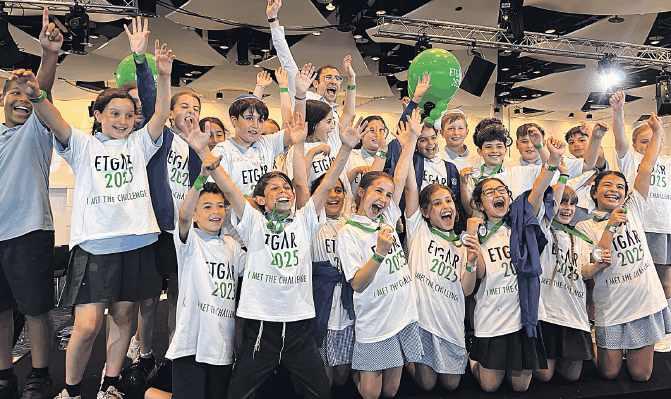
on year, even as the tests become tougher. At Wembley, every child now also joins in the songs sung on stage, including Hatikvah
In 2013, they launched Etgar with a single Sunday quiz, attended by 200 children. The following year it doubled, and soon every mainstream Jewish school wanted in. Today, about 1,000 pupils from 28 schools gather each summer at Wembley for European Jewry’s biggest educational event. Since its inception, more than 10,000 children in the UK have taken part, and more than 15,000 worldwide.
Each child receives a highquality printed Jewish general knowledge handbook. “It is crucial that the books are published and bound to a really high standard,” Rosenfelder says. “Every kid has to receive their own book, which we really want them to keep forever, so they can keep sneaking a peek when they’re 20 or 30.”
The year of preparation ends with a high-energy inter-school quiz. At Wembley, teams of ten confer over carefully-designed questions. “We try very much to avoid these regurgitative questions,” she insists. “It’s not just rote learning. One of the questions we had this year was we had a picture
The programme is evidencedriven. Every year, the organisers analyse all 100 quiz questions, rating their difficulty and tracking how children respond. “We’ve made the quiz harder and harder each year,” Rosenfelder says. “And the kids’ scores have gone up. That really shows how Etgar is impacting.”
By completing the quiz at the end of the year, organisers can measure how much pupils from different schools have absorbed.
“We know that they know more and are more familiar with their Jewish knowledge,” Rosenfelder explains. The figures bear this out: median scores have risen year
The impact is backed by qualitative surveys. Teachers consistently rate the challenge around 4.8 out of five for management, enjoyment, and effectiveness. Informally, too, responses are powerful. Parents text Rosenfelder to say Etgar has completely transformed their child’s engagement with Jewish learning. Teachers sometimes leave Wembley in tears: “We just hadn’t expected how badly we needed this.”
The project arrives at a critical time. This summer’s Jewish Policy Research survey concluded that while upbringing remains the strongest predictor of Jewish identity, “no single programme” carries the weight alone. The Chief Rabbi’s

own education review earlier this year acknowledged “a lack of effective Jewish knowledge” among some pupils despite years in Jewish schools. Rosenfelder welcomes the recognition. “This was the first one that actually acknowledged the fact that kids don’t know very much. The question is how you shift that.”
Her answer is to complement, not criticise, schools. Etgar provides the handbooks, weekly challenges and the final event, while teachers decide how to teach and integrate it into their own classrooms.
“They’re really best placed to be teaching this,” she says. “They know the kids, they know the nature of your schools. We will give them all the resources they need.”
What began as a UK project is now spreading abroad. After early experiments in South Africa, Etgar launched in Paris this summer with 250 children, projected to rise to over 600 next year. The handbook has already been translated into French, Hebrew and Hungarian.
The programme now runs in Hungary, South Africa, France and Ireland, with launches this year in the UAE and Atlanta, Georgia. Talks are also under way for a Nordic edition, with translations planned into Swedish, Danish, Norwegian and Finnish, while communities in Brazil, Argentina and Mexico are exploring Portuguese and Spanish
versions. Israel is expected to host its own challenge soon. “It’s really going global,” Rosenfelder says.
Running Etgar remains lean. The organisation currently has just three part-time staff and relies on support from major funders including JNF UK, the Charles Wolfson Charitable Trust and the Dorset Foundation. Schools pay a small charge per pupil to take part, with the remainder of costs covered by philanthropy.
“Success in three to five years is to see Etgar embedded in the UK Jewish community and in other communities around the world, reflecting the importance of having a basic standard of Jewish knowledge,” Rosenfelder says. “
“Together with expansion of the programmes in the UK and abroad, we are also looking at our own structural growth so we can meet the growing demand for an evaluated, experiential Jewish knowledge programme, which we welcome.”
Asked what she most wants Jewish News readers to take away, Rosenfelder doesn’t talk about numbers, funding, or even Wembley. Her message is simpler. “I just want the community to care a bit more. Without caring, we’re losing. You can’t just do it through a feel-good factor. A positive learning experience is critical – but knowledge is also really critical. If you do both, you’ve got a winning formula.”




We are delighted to invite you to our

With Guest Speaker Brendan O’Neill journalist, author and champion of Israel
Wednesday 17th September 2025 3pm-5pm
Venue: North West London
Price £20 per person
RSVP: 020 8732 6143 or email kklevents@kkl.org.uk


Fabricated images of Holocaust victims generated by artificial intelligence are still circulating on Facebook, months after both Auschwitz Memorial and Jewish News raised alarms and formally reported the accounts behind them, writes Annabel Sinclair.
In May, Jewish News revealed how pages such as 90’s History were copying names and dates from Auschwitz archives, replacing genuine photographs with stylised AI portraits and inventing false scenarios for murdered victims. Auschwitz Memorial condemned the practice as a “profound act of disrespect” and confirmed it had flagged the content to Meta.
cifically to go viral and exploit Meta’s contentmonetisation programme.
In one instance, an authentic image of camp victim Léon Gorfinkel shared by Auschwitz Memorial was replaced by 90’s History with an AI-generated birthday scene.
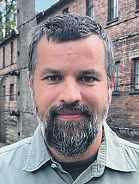
Now, a BBC investigation has shown the phenomenon is part of a sprawling international spam network, with operators based in Pakistan, India, Vietnam, Nigeria and elsewhere. These creators collaborate in private groups to mass-produce “AI-slop” – lowquality AI images and captions – designed spe-





One Pakistani account, named Abdul Mughees, posted screenshots claiming more than 1.2 billion views and £16,000 in revenue over four months. Although those figures could not be independently verified, the BBC’s analysis found dozens of accounts pushing almost exclusively fabricated history content, with Holocaust imagery proving a reliable tra c driver.
The posts have included invented scenes of prisoners playing violins, children abandoned on train tracks or lovers meeting across camp fences. Many pages had previously impersonated businesses, influencers or even o cial bodies before being repurposed to churn out Holocaust AI images.



Others boosted reach by mass-sharing each other’s posts into history groups, e ectively driving monetisation. Memorial spokesman Pawel Sawicki said: “We have somebody making up the stories for some kind of strange emotional game happening on social media. This is not a game. This is real su ering… we want to and need to commemorate.”
Meta confirmed to the BBC that while some accounts were removed for impersonation or “inauthentic behaviour”, the fabricated Holocaust photos themselves did not breach the social media giant’s policies.
The result is that AI images, condemned by Holocaust institutions, remain visible on the platform months after being reported.
Dr Robert Williams of the International Holocaust Remembrance Alliance said survivors and their families were deeply unsettled.
“They don’t quite understand what they’re seeing,” he told the BBC. “They feel a certain sense of sadness that this has been allowed to happen… because the last of the survivors will soon leave us.”
Auschwitz Memorial has warned the surge of digital fabrications risks distorting historical understanding, especially as the number of authentic photographs from inside Auschwitz is limited. In a June post, it described AI images of victims as a “dangerous distortion” that “disrespects victims and harasses their memory”.
Yet the content remains online, raising questions about how seriously Meta treats the integrity of Holocaust remembrance on its platforms – and whether policy loopholes are enabling spammers to profit from genocide. Editorial comment, page 16

















A self-described “part Palestinian British NHS doctor”, who regularly posts diatribes on social media about “Jewish supremacy” has announced she has been referred to an Interim Orders Tribunal (IOT), blaming articles from Jewish News as part of the reason, writes Daniel Sugarman.
Dr Rahmeh Aladwan, who was also an activist for Palestine Action until the group was proscribed as a terrorist organisation, announced “the UK ‘israel’ lobby has pressured my government and medical board into referring me to a tribunal hearing to try and suspend me for opposing genocide. This is Britain. We are occupied.”
She added: “This is not the result of any pro-

fessional failure, but the outcome of a coordinated lobbying campaign against me because of my public stance against the genocide in Gaza being carried out with my tax pounds.”
In reality, as Jewish News readers will be aware, Aladwan has continuously made highly inflammatory statements about Jews, including the claim “the UK is occupied and controlled by Jewish supremacy – in fact most Christian majority countries are”.
She previously described the Royal Free Hospital in London, which due to its location sees a large number of Jewish patients, as a “Jewish supremacy cesspit”, and has stated “doctors and healthcare workers who support ‘Israel’ are complicit in crimes against humanity. For the safety of children and the public, they must be investigated.”
Aladwan has also directed her vitriol against Jewish schools in the UK, blames Israel for both world wars and 9/11 and has made no secret of her thoughts on Hamas, posting: “I don’t condemn Hamas. I don’t condemn October 7. I don’t condemn armed resistance to Occupation. I condemn ‘Israel’.”
Aladwan’s referral to the IOT does not guarantee she will no longer be able to practice medicine in the UK. Jewish News
Monday 29 September 2025
6.30 – 8pm

reported last month how a friend of Aladwan’s, Dr Rehiana Ali, had her suspension lifted by the tribunal, despite her similarly posting diatribes about “Jewish extremism”,
The GMC said it was “only able to confirm the publicly available information about doctors as it appears on the medical register”.
At the time of writing, Aladwan is still registered on the GMC website with a licence to practice, which suggests she will not have her licence suspended before the hearing.
The UK government has blocked Israel defence ministry officials from attending a major annual defence conference in London after citing Benjamin Netanyahu’s decision to escalate the war in Gaza.
The DSEI UK defence conference in the capital usually sees Israeli government and military officials in attendance to view the exhibition of weapons and other military equipment. The 2025 show is scheduled for 9-12 September.
Its website states: “DSEI UK is a pivotal event for the global defence industry. As the flagship defence event for the UK, DSEI UK promotes the UK’s defence ethos, agenda and leadership while encouraging opportunity and cooperation with our global allies.
“The world’s leading defence organisations and most influential stakeholders rely on DSEI UK’s unique ability to bring the right people together, at the same time. ”
A Ministry of Defence spokesperson told the Politico newsite: “The Israeli government’s decision to further escalate its military operation in Gaza is wrong.
“There must be a diplomatic solution to end this war now, with an immediate ceasefire, the return of the hostages and a surge in humanitarian aid to the people of Gaza.”
Despite the ban on defence ministry officials, Whitehall sources have confirmed Israeli arms companies will still be able to take part in DSEI if they wish.

Join us at our IC6 Open Evening, meet our Sixth Form Team and specialist subject teachers along with current IC6 Student Leaders across a range of areas. Discover how Immanuel College offers you a personalised path across A-Levels and BTECs. Sign up for our Open Evening and start your IC6 journey A-Level and BTEC Excellence in 2025
64% A*-A 88% A*-B
100% of BTEC students achieved D*-D, the equivalent of A*-A
Blackburn MP Adnan Hussain has appeared to suggest Jewish victims of the Nazi Holocaust could have been provided “with land for a homeland in Europe” rather than in Israel, writes Lee Harpin.
The independent MP, elected on the back of support for the Palestinian cause, made the claim in an online debate about Zionism as he sought to defend Jeremy Corbyn’s stance on Israel and Palestine after tensions among supporters of the new left-wing Your Party.
Hussain responded to criticism by notorious ex-Momentum activist Jackie Walker in a post on X after she highlighted Corbyn’s failure to take an openly anti-Zionist position like coleader of the new party, Zarah Sultana.
Walker, who was expelled from Labour over claims including antisemitism, said: “We are talking about Zionism now, not in some mythological space.
“How can a Jewish homeland be established without settler colonialism and supremacy?”
Hussain wrote: “The question is actually complicated and not black and white. You can believe the Jewish people, especially after the horrors of the Holocaust, had the right to a homeland, and simultaneously be utterly

opposed to a settler colonial project ethnically cleansing and committing genocide against the Palestinians.
“Who in their right mind is going to doubt JC is opposed to that? He’s dedicated his whole life to opposing it, and has paid a very heavy price.”
The MP added he was “extremely suspicious of the motives behind the people asking for a quick soundbite of a clear-cut yes or no” in regards to Corbyn’s position on anti-Zionism.
Hussain then suggested: “Europe could have atoned for its
evil and provided its victims with land for a homeland, in Europe.
“This is why it’s not black and white, the word zionism has many connotations and isn’t black and white. JC is very clearly opposed to the settler/colonial/genocidal aspect.”
Walker responded: “This is ridiculous! We are where we are NOW. Please don’t give me that nonsense about spiritual Zionism.”
Hussain had previously been criticised for describing online Israel’s plan to “concentrate” Gazans in Rafah as “gas chambers” .
Jewish groups called the comparison o ensive and disgraceful, urging him to withdraw his remarks.

Dave Rich, of the Community Security Trust, said at the time:” It is hard to think of any more pointed use of Nazi language and imagery than what two Independent MPs, Iqbal Mohamed from Dewsbury and Batley and Adnan Hussain of Blackburn, posted on X this week.
Trust, said at the time:” It is hard to think sain posted: ‘We’re on the con-

“Mohamed accused Israel of committing a ‘holocaust’ in Gaza; Hussain posted: ‘We’re on the concentration camp stage. Gas chambers next?’”
The Commonwealth Jewish Council (CJC) has announced the appointment of Arieh Miller as its new chief executive o cer.

Miller, who stepped down from the top role at UJS in March after more than six years, will head CJC as it continues to strengthen Jewish communities across the 56-nation Commonwealth, ensuring they are supported, connected and represented on the global stage.
The transition sees Clive Lawton, who has led the CJC for nearly a decade, move to an ambassadorial role.
CJC president and chair of trustees Lord Mendelsohn said he was delighted to welcome Miller: “Our organisation has never had a stronger global presence or more vital mission. Under Clive’s exceptional leadership, we have built robust foundations and key partnerships. Now, Arieh’s leadership will ensure the CJC grows and thrives.”
Miller said: “I am deeply honoured to lead CJC at such a significant moment. Having long admired the CJC’s vital work connecting and empowering Jewish communities across continents, I am energised by the opportunity to build on Clive’s remarkable leadership.”






Celebrate Sukkot on the shores of Lake Garda at Hotel Villa Maria, Desenzano.




The hotel will be specially prepared for Sukkot, including a stunning Sukkah, Glatt Kosher meals, onsite Synagogue, Chazanim and much more
Hechsher is strictly Mehadrin at the highest standards under the supervision of Rabbi Borenstein, Senior Chabad Rabbi in Italy
Family Room Glatt Kosher


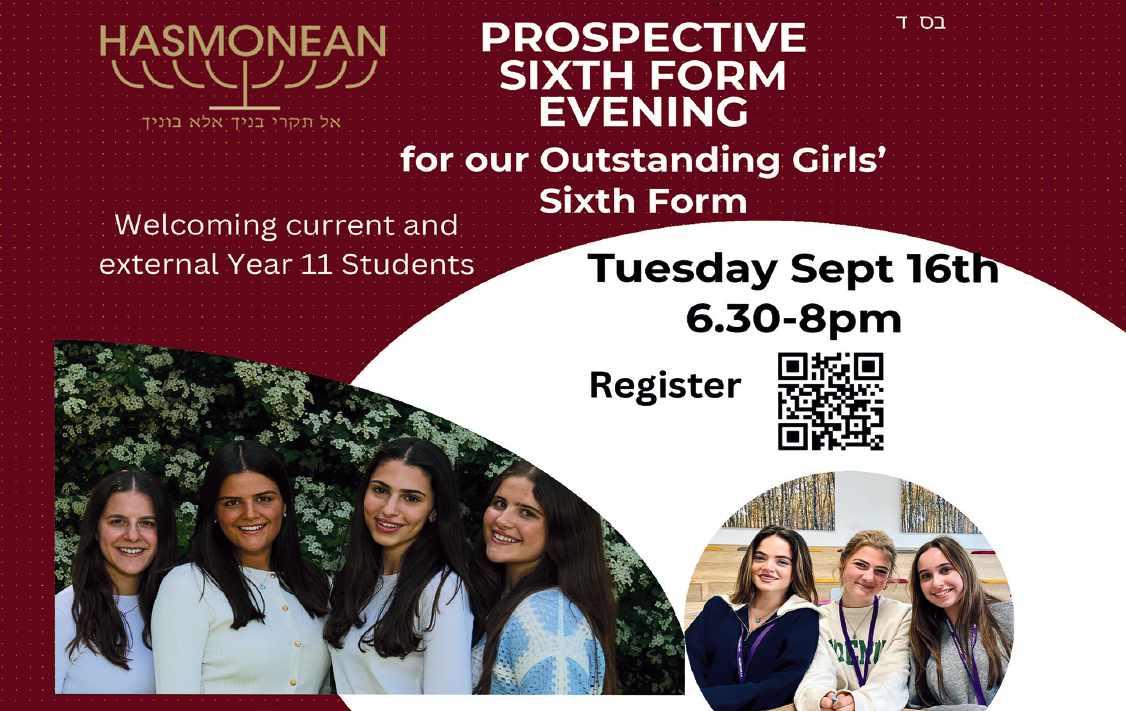
Hanna Veiler has barely settled into her new role as president of the European Union of Jewish Students (EUJS) when she takes a call at a noisy airport, en route to mark 250 years of Jewish life in Sweden. “It’s already all over the place,” she laughs, “we haven’t officially started in the office yet, but it’s already busy,” writes Annabel Sinclair.
At 27, Veiler has fast become one of the most prominent young Jewish voices in Europe. Born in Belarus in 1998 and raised in the spa town of Baden-Baden in Germany’s south, she grew up as the only Jewish child in her school. “All of this politicised me very strongly from a very young age,” she recalls. After finishing school, she volunteered in Israel, worked in a facility for people with disabilities, and learned Hebrew – an experience that sharpened, rather than resolved, her questions of belonging.
On returning to Germany, she began studying art history in Tübingen, only to discover Jewish students had no real place on campus. “There was no space for us, no initiative,” she says. “People had to travel for something like an hour on the train to be able to join a Shabbat dinner. So, I decided to do something against it. I founded a local Jewish initiative.” That move led her into the Jewish Student Union of Germany (JSUD), where she eventually became president, representing 25,000 young Jews before stepping onto the EU stage.
“EUJS has always been the place for me where I felt the most at home with my Jewish identity, because I didn’t have to be German or an Eastern European Jew,” she explains. “There was some sort of pan-Euro-

pean identity that we all shared.”
Now she takes charge of an umbrella body representing 36 national student unions. It is, she says, in good shape: “EUJS is in a very stable position. It’s widely recognised as the platform for young Jewish voices across Europe.” But she insists her leadership will be defined by a clear, unapologetic stance. “I think what I bring is the experience of building something from scratch, while also leading on the biggest national stage,” she says.
Central to her vision is reclaiming Jewish narratives.
“Over the past two years we’ve been pushed against the wall. We could not decide anymore how we want to tell our stories. I do think it’s about time for us to… start proclaiming our own narratives,
meaning going out into the world and telling our stories that are diverse, challenging, full of resilience — and to tell them with our own confident voice.”
One of her first projects is to open EUJS’s archives and turn them into a travelling exhibition.
“We have proof that young Jews have never been passive, but have always been active in shaping European identities, shaping their lives and shaping democracy,” she says. It is, she argues, as much about showing students their inheritance as it is about demonstrating to the wider world that Jewish youth are not defined by antisemitism.
That fight remains urgent. She describes antisemitism on campus as “a pan-European movement” – organised, globalised and ampli-
fied online. “Those responsible are extremely well connected,” she warns. “We need to be ready to react.
And I do believe it’s also about time for students to consider legal means.
Talking doesn’t help much anymore.”
Her plans also include creating a dedicated Eastern European network within EUJS to reflect the particular pressures facing postcommunist Jewish communities and investing in smaller unions to professionalise and grow. “Specifically, the unions from former communist countries are facing different challenges,” she explains.
“I want to create a platform where they can have a voice, educate others, and formulate concrete asks of EUJS leadership.”
Politically, she is determined that EUJS will hold its ground in European institutions even when the environment is hostile. “There are a lot of discussions of, shall we stay or should we leave? Our position is clear. We’re staying. We keep calling hate out, we keep fighting for Jewish rights, we keep fighting for democracy, we keep fighting polarisation.”
Looking ahead, she is candid about the scale of the challenge.
“The space for Jewish students is becoming smaller and smaller,” she admits. “We need to empower the next generation of leaders with adaptive skills, because we may wake up in a world that changes overnight. That has happened to us several times.”
For Veiler, success will be measured not in headlines but in leadership succession. “I hope that the moment I leave, there will be ten other people wanting to run for presidency and 50 wanting to run for board. You can only judge the achievements of a leader by how many other leaders they have produced in their time.”
Her final message is unflinching. “The times are difficult, but I want everyone to know that the young Jewish generation is not giving up. We’re fighting, and we’re doing it every day. We are experts for a lot of topics that are very relevant right now, and we will make sure to have a seat at every possible table.”
It is not a slogan so much as a declaration: Europe’s Jewish students are ready to speak, and under Hanna Veiler, they plan to do so loudly.


Ten more strictly-Orthodox charities have been named as part of a statutory class inquiry announced by the Charity Commission, into evidence that cheques have been cashed with a value of £22 million over a 15-month-long time frame, writes Lee Harpin.
In May 2024, following an unannounced visit by HMRC to a company in Hackney, 105 charities were found to have cashed cheques with it to between December 2021 and March 2023.
At the time, 10 charities were named as part of the inquiry, but the commission has confirmed it has now extended its inquiry to include further Charedi concerns.
The new list includes the Ezer Viznitz
Foundation, set up to provide education of young people and poverty prevention, Satmar Nursery Trust, again listed as providing education for youngsters, Lehachyos, who offer grant to institutions advancing education, Dover Sholem Trust, listed as advancing Orthodox religious education, and Friends of Yeshiva Daas Sholem, again set up to advance Orthodox studies.
The Vyoel Moshe Charitable Trust, the ZSV Trust, United Talmudical Associates LTD, Forty Limited, and Bnois Jerusalem Schools complete the list of 10 new names.
The Commission has confirmed it has issued an immediate order to temporarily stop any of the charities under inquiry from
issuing cheques without its prior consent. Its inquiry will aim to determine how the charities have transferred funds, how trustees had oversight of what happened to funds exchanged for the cheques and if this cash has been used properly to support what the charities were set up to do.
The Commission will also seek to establish how trustees determined that these financial transactions were in their charity’s best interests.
Last year the Commission said it had prioritised charities based on the volume and value of cheques involved.
It also confirmed the number of charities under investigation is expected to increase as the inquiry progresses.
An Israeli couple have made an “historic” £130m donation to the Rabin Medical Centre/Beilinson Hospital, writes Jenni Frazer.
Anat and Dr Shmuel Harlap’s gift, said to be the largest donation to the Israeli healthcare system, will enable the construction of a new Heart and Brain Centre at the Petach Tikva hospital complex.
The Harlap family have announced the new facility will be named “The Tower of Hope”, symbolising their desire to help healing divisions within Israeli society. It will open in 2027.
Shmuel Harlap, who made his fortune in car importing and licensing in-car technology, has been a longtime philanthropist in Israel. After the 7 October 2023 attacks, the Harlaps donated 120 Mitsubishi Space Star cars to four of the southern kibbutzim devastated by Hamas terrorists.
The couple said: “There is no place more fitting than a central public hospital to symbolise the healing of divisions within Israeli society. The Tower of Hope will serve all sec-

tors of the Israeli public – secular, religious, ultra-Orthodox, Muslim, Christian, Druze and Circassian. It will be a lighthouse of hope for all, and if we are fortunate to bask in its light, that will be our reward.”
Hospital chief executive Dr Eytan Wirtheim said: “This is an extraordinary and deeply moving gift, particularly because it is a ‘Blue and White’ Israeli contri-
bution from Anat and Dr Shmuel Harlap. Their donation will transform Israeli medicine.”
The 300-bed tower will house cardiology, neurosurgery, neurology and thoracic and cardiac surgery departments with three floors of protected spaces with operating theatres, imaging units, catheterisation labs and ICUs for cardiac, cardiothoracic, neurology and more.
A gold coin from more than 2,200 years ago has been found during excavations on the outskirts of the Old City of Jerusalem, with archaeologists hailing it as the first of its type found outside Egypt.

The dig, at the City of David archaeological park, shows the Ptolemaic Queen Berenice II. The coin is smaller than a fingernail but almost entirely pure gold. Only 20 are known to exist and this is the first to have been found during an archaeological excavation.













Rivka Langler, who made the dis-



covery, said: “I saw something shiny, picked it up and it was a gold coin. I’ve been excavating here for two years, and this is the first time. I saw other excavators making discoveries and I kept waiting for my moment. Now it has finally arrived.”
Israel education minister Yoav Kisch has warned school principals who call for an end to the Gaza war they could face disciplinary measures.
His comments followed release of a video featuring dozens of principals urging an immediate ceasefire and a deal to secure the release of the remaining 50 hostages.
It was the second statement from the group, who wrote to colleagues that “out of an educational and moral responsibility, we call for an end to the war and the immediate return of all the kidnapped”.

Kisch dismissed the statement and in turn accused Hamas of being responsible for the su ering in Gaza and labelling the “starvation campaign” a propaganda e ort.
The minister added: “We will not allow politics to be brought into the schools,” according to reports in the Israeli media.

Holocaust denial has always relied on distortion. But the rise of artificial intelligence has taken revisionism to new, grotesque depths. Fabricated images of Auschwitz victims, generated by algorithms and dressed up as authentic history, are now circulating across Facebook. They are not the work of fringe extremists with a political agenda but of cynical spammers chasing clicks and cash. The outcome is no less poisonous.
This is not merely a technical breach of policy. It is the systematic corruption of memory. Genuine photographs are being replaced with invented scenes – birthday parties behind the barbed wire, lovers meeting across camp fences – that trivialise genocide and confuse audiences, especially young users who will never encounter survivors in person. When the Auschwitz Memorial calls such content “a profound act of disrespect”, it understates the scale of the threat.
We are at a crossroads. Within years, the last precious eyewitnesses to the horrors of the camps will be gone. What remains is genuine, priceless testimony, archives and photographs. If these are swamped by AI fabrications, the world’s understanding of humanity’s darkest hour will be fatally compromised. To poison that well is to gamble with historical truth itself.
Platforms are quick to remove sexual content or copyright breaches. They must apply the same urgency here. Allowing profiteers to monetise genocide imagery is not negligence but complicity.
This episode is not a passing scandal but the most sinister chapter yet in Holocaust revisionism. If Meta fails to act decisively, it risks presiding over the digital erosion of truth itself.

RABBI DR RAPHAEL
DEAN OF
ight now, the House of Lords is debating one of the greatest moral issues of our time. Introduced to Parliament last year, the End of Life Bill will enable a person who is terminally ill and meets certain criteria to request and lawfully be provided with assistance to end their own life.

Chief Rabbi Mirvis has eloquently opposed the bill, explaining that it would “impose a new and immeasurable pressure upon terminal patients, who are already extremely vulnerable”. When a similar bill was proposed in 2006, Chief Rabbi Sacks also contested it, saying: “Life is sacred. It is God’s gift not ours.” That bill was rejected by the House of Lords at its second reading.
In the 1980s, Chief Rabbi Jakobovits, along with several other rabbinic arbiters, concluded that any form of active euthanasia is prohibited in Jewish law, although the withdrawal of factors that may artificially delay the patient’s death in the final phase are allowed.
This subtle balance is not always easy to apply in practice.
What concerns me is why the demand for assisted dying is growing predominantly in western countries. Wishing to end one’s life due to unbearable pain and no hope of recovery is understandable, and the desire to assist someone in this situation is genuinely compassionate. Indeed, possibly the oldest recorded instance of assisted dying is the merciful death of King Saul at

the hands of an Amalekite servant after the King’s unsuccessful suicide attempt. However, the fact that modern liberal democracies lead the call for assisted dying exposes something very worrying. Individual choice has become so strident that it overrides any other value. Today, unfortunately, rights tend to trump responsibilities.
In contrast, like all faiths, Judaism believes that life has a deep purpose. The gift of existence calls us to live responsibly. Personal autonomy does not just mean we can do what we like, it means we have the ability to discover our own particular way of making a difference. Every moment is an opportunity: to learn something new, to alleviate hardships of those less fortunate, to have meaningful experiences, to build loving relationships with family and friends, and to contribute to a more caring society.
There is a story of a rabbi on his deathbed. When his students asked him why he looked troubled, reassuring him that his virtuous life meant that he was surely bound for the World to Come, he responded,
Thank you for helping to make Jewish News the leading source of news and opinion for the UK Jewish community. Unlike other Jewish media, we do not charge for content. That won’t change. Because we are charity-owned and free, we rely on advertising to cover our costs. This vital lifeline, which has dropped in recent years, has fallen further due to coronavirus.
Today we’re asking for your invaluable help to continue putting our community first in everything we do. For as little as £5 a month you can help sustain the vital work we do in celebrating and standing up for Jewish life in Britain.
Jewish News holds our community together and keeps us connected. Like a synagogue, it’s where people turn to feel part of something bigger. It also proudly shows the rest of Britain the vibrancy and rich culture of modern Jewish life.
You can make a quick and easy one-off or monthly contribution of £5, £10, £20 or any other sum you’re comfortable with. 100% of your donation will help us continue celebrating our community, in all its dynamic diversity. Support Jewish News by visiting our donor page at jewishnews.co.uk


“In this world, with just a few coins, I can do a mitzvah and help someone, but where I’m going, I can’t do a thing.”
Even at the end of life, even when in terrible pain, life still has purpose. In Kathryn Mannix’s moving book, With the End in Mind, a patient told her: “I wanted euthanasia, and no one could do it. But if they had… chances are I would have asked too soon… I was angry with you because you’re part of the System that says no to assisting with dying. But you weren’t saying no to dying, you were saying yes to living.”
In the Unetaneh Tokef prayer on Rosh Hashanah and Yom Kippur we sing, “Who will live and who will die? …who by fire, who by water? …who in serenity and who in anguish?” We recognise the fragility and limits of life, but then we choose to respond with “Repentance, prayer and charity”. This is what it means to be “inscribed in the Book of Life”. It feels undignified to be greatly diminished by terminal illness, but in this last stage of life dignity can come in the response of the person dying and of those around them.
Life is always a struggle, but we should fill our days rather than try to reduce them.
u Rabbi Dr Raphael Zarum is the Dean of the London School of Jewish Studies (LSJS) where he holds the Rabbi Sacks Chair in Modern Jewish Thought. He will discuss the End of Life Bill with Dr Lindsay Simmonds on Monday 8 September. Book at www.lsjs.ac.uk















‘No, it’s not a new campaign. I was painting a St. George’s cross and I got chased by a wasp!’

















GIDEON FALTER CHIEF EXECUTIVE, CAMPAIGN AGAINST ANTISEMITISM
It has been nearly two years since Hamas’ barbaric attack on 7 October 2023. Two years since some 1,200 people were murdered in the deadliest massacre of Jews since the Holocaust. Two years since some 250 people were taken hostage, dragged into Gaza to be held in unimaginably cruel conditions, designed to prolong their suffering.
And it has been nearly two years since that brutal assault, committed by terrorists, changed the Britain we know into a Britain that is barely recognisable.
In today’s Britain, just last week a swastika was sprayed on a rabbi’s home, a Jewish boy had reportedly been shot at on Shabbat by a thug with an air rifle, protesters outside the Israeli Embassy in London declared that “This will become the Embassy of Palestine”, the British wheelchair basketball team turned their backs to
the Israeli players during Israel’s national anthem, and a Jewish nanny with a baby was accosted in the street.
We all now live our lives against a backdrop of inflammatory coverage from our national broadcaster, bile being spewed by our NHS doctors on social media, and our venerable arts institutions and universities – many of which Jews have contributed so much to – excluding or enabling the harassment of Jews.
Over the past three weeks, we have projected the testimonies of British Jews onto the BBC, National Gallery and King’s College London. They are powerful personal stories about the prejudice in the media, arts and education sectors that are all too familiar to us now.
Antisemitism has become pervasive.
This is not the Britain that once prided itself on fairness, tolerance and safety for Jews – the Britain that we were so proud of. Extremists will stop at nothing to intimidate us – and all too often, the authorities are looking the other way.
The rise of extremism in this country and the dismal appeasement of our law
enforcement authorities have not gone unnoticed, however.
This country has long been renowned for its tolerance and sense of decency. That Britain is seething. It started silently, but there is an unmistakable change taking place. Our once-trusted BBC is increasingly seen as partisan. Our renowned police forces are being caught out time and again applying double standards.
The discontentment comes not from the extremes but from the silent majority that we have long wanted to believe might find its voice, and perhaps at last it is.
That is why Sunday is so important. There are a lot of people in our community
who are feeling alone. There are so many outside our community who are angry about the failures to stand up for the values of this great country, and they are angry too about how we are being treated.
On Sunday, we will gather to show everyone this strength of feeling.
If you have been crying out for the silent majority to speak, this is your moment. If you have been wondering whether our Jewish community will make a stand, this is for you.
We will stand together as one, people of all faiths and none, to demand that our broadcasters stop their incitement, that our police forces enforce our laws, and that the doctrine of appeasement that has rotted our national discourse gives way to a steely determination to fiercely tackle the extremists. That is what our country needs, it is what its people want, but our politicians will only listen if we show our strength of feeling.
Please join us on Sunday at 1pm at the corner of Hallam Street and Weymouth Street in Marylebone. It is time to make our voices heard, before it is too late.
























grit it’s taken for steadfast volunteers to turn up every night to lead. In wind, rain and heat, and even during the tail end of hurricanes.
Last Sunday marked the final service for our 7 October memorial in Brighton’s Palmeira Square. Ever since the shloshim – the 30 day mourning period – after the Hamas massacre, we have held a public service there each evening. Now, however, the council is redeveloping the square so the decision to remain was out of our hands. It is time to move.
But this is also the start of something new. The memorial will still be public, still unapologetic, as the Chief Rabbi called it.
It will sit outside the nearby Reform shul on Palmeira avenue and retain its name.
Services will become weekly – on Fridays at 6:30pm – and all are very much welcome. An end and a beginning; a duality, as this place has always been.
At this site, we’ve seen love and hate. Grief and joy. Where we’ve wept and laughed, fought back and hugged tightly. We’ve seen the sheer
There were regulars who came to the services so reliably, they formed a family of sorts. We thank you.
Thank you to the one who lit a candle every single night for the hostages.
Thank you to the one who quietly removed the hateful stickers that constantly appeared around us.
Thank you to the child who picked a wild flower and gently placed it on the box of stones every time she passed.
Then there are those who stopped by at other times; to pray, leave a token, to weep or share a kind word. Those who kept an eye on the memorial— sometimes even challenging us when we ourselves came near it!
We have seen so much love. For the last three weeks a supporter from America has sent huge displays of flowers which have sustained us. When a hateful person destroyed the memorial entirely, there was an outpouring of outrage and empathy and we raised £1500 overnight. The generosity of time, emotion and donations has overwhelmed us.
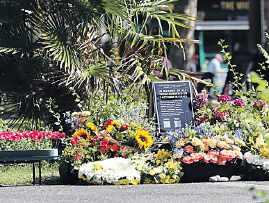
There were times I felt deep despair and didn’t feel up to coming to a service. But every single service, I came away feeling better. Even if something bad happened.
Because it was real. It was here. I could share my anger and fear and despair. The connection made it bearable. I thank all of you for that gift.
This place has been about mourning our losses but also defending our humanity. The victims of 7 October have been dehumanised to the point where reminding the world that they existed is a profound act of resistance.
To get the best value from your private medical insurance, you should speak to an expert who is qualified to advise you on the right policy for you, and recommend the providers who offer the most competitive premiums. This advice covers individual, family and company policies, and is always FREE.
As an independent health insurance expert, I work with the healthcare insurers to provide you with the appropriate and most affordable level of cover. So whether you have an existing policy or not, let’s have a chat.

We spoke their names—and names have power. We told their stories and we brought them back. So many families of victims are deeply grateful for this. They feel forgotten, removed from the story of their own loss. We will not let that happen.
So this is an end and a beginning, because we’re just getting started.
The red anemone has come to symbolise memory and hope. They grow all over southern Israel where these horrors happened. At the Nova site and the car graveyard installations, these anemones flow, in beauty and death.
There were always candles at our memorial. Light in the darkness. Ever present.
We have asked people to give and now we ask them to take. Take a piece of the memorial into your home. An anemone. A candle. For memory, for hope. Place them on your mantle and into your heart.
Because remembrance is an act and not a place.
To receive a Palmeira candle holder, email palmeiramemorialgroup@gmail. com or follow on Instagram @palmeiramemorial




JONATHAN HAROUNOFF
ISRAEL’S INTERNATIONAL
SPOKESPERSON TO THE UN
Since the horrors of 7 October, Australia has been engulfed by a wave of antisemitism unlike anything in its modern history. Synagogues firebombed, Jewish businesses attacked, swastikas plastered on Jewish community centres and mobs chanting openly in the streets of Sydney and Melbourne for the extermination of Jews. At first glance, the hatred seemed homegrown, an eruption from within.
But not all. Some, disturbingly, can be tracked more than 8,000 miles – to Tehran.
Australia recently took a dramatic step not taken since World War Two: expelling a foreign ambassador. The envoy was none other than Ahmad Sadeghi, representative of the Islamic Republic of Iran. The decision followed findings by the Australian Security Intelligence Organisation (ASIO) the

regime’s Islamic Revolutionary Guard Corps (IRGC) was linked to two antisemitic arson attacks last year – not the work of random extremists or online agitators but foreigndirected terrorism on Australian soil.
For 46 years, the Islamic Republic has terrorised its citizens, especially women and minority groups, while destabilising the Middle East via a dangerous foreign policy and a sprawling proxy network including Hamas, Palestinian Islamic Jihad, Hezbollah and the Houthis. Less understood is the regime’s infiltration of its terror cells into the beating heart of Western democracies.
The plots in Australia are part of a larger pattern across the West. In London, Paris, Berlin, Washington and now Sydney, the Islamic Republic’s security services have been caught red-handed running covert operations, often targeting Jews, dissidents, journalists and Western o cials.
In Britain, MI5 director general Ken McCallum disclosed Tehran was behind at least 20 major plots on UK soil, which presented “potentially lethal threats”.
These weren’t idle threats. In 2022,
the IRGC tried to assassinate two anchors at Iran International for their coverage of protests sweeping Iran. Two years later, a colleague was stabbed in the leg outside his London home — a chilling reminder of how far Tehran is willing to go to silence dissent.
The US has also been in the crosshairs.
In March, two men with ties to the Islamic Republic were convicted in a plot to murder Iranian-American journalist and activist Masih Alinejad in her Brooklyn home.
Several attempts on president Donald Trump’s life and plots to kill US o cials Mike Pompeo and John Bolton, outspoken critics of the regime, by Tehran-linked agents were also foiled.
Australia expelling the Iranian ambassador is not only justified but long overdue. Tehran’s agents have already crossed the line from intimidation to violence here, as elsewhere. But expulsions alone are not enough. Democracies cannot a ord to treat this as business as usual.
The IRGC is not a distant menace. It is a global terror organisation, machinating in London, striking in Melbourne and threat-
ening in Washington. The regime does not distinguish between Israelis abroad, Jewish communities in the diaspora, or Western o cials. Its targets are anyone who challenges its authority, ideology or survival.
The West has too often responded piecemeal, as if these plots were isolated rather than elements of a single coordinated strategy, and that has emboldened Tehran.
What is required now is a coordinated Western pushback – prosecuting agents of the regime when they are discovered, tightening sanctions not only on the IRGC but on the financial networks that enable its vast reach, and designating the IRGC, formally and unambiguously, as terrorist.
RABBI DAVID MASON
EXECUTIVE DIRECTOR, HIAS+JCORE
Enough is enough. These words have been spoken boldly by our community about a host of serious issues. Now we must address them to the dangerous wave of anti-refugee hate spreading across the country.
You might ask – doesn’t our community have enough to concern itself with? And yes, from rising antisemitism, our deep worry about the hostages and the dire humanitarian situation in Gaza too – and I’m sure for many closer to home, the recent A-level and GCSE results – there’s been plenty to deal with.
But our country’s and society’s treatment of refugees must remain personal to us.
After all, it’s not so long since violent forces in the UK sought to drive out our family members who had escaped here.
I know this comparison will draw the ire of some. So let me be clear: yes, parallels between that extremely dark period of the 20th century should not be made lightly, and the situation today is very di erent from then. Yet – and I write as the grandson
of refugees whose lives were saved by this country – it would be remiss to ignore echoes in how newcomers are treated here.
So more sceptical readers will have to forgive the robust tone of this piece. With that, I would ask two questions to those who might be tempted to side with the recent demonstrations.
The first: when we see thousands of protesters intimidating people seeking asylum, are we not reminded of the ugly scenes when British antisemitic movements marched against Jewish refugees in the 1930s and 1940s? We understand too well how it is to be tarred with the same brush.
And the second: do our Jewish values not compel us to stand with those escaping the horrendous conflict in Sudan, the murderous invasion of Ukraine and people in fear of their lives fleeing other conflicts today?
There is an uncomfortable reality to this. We know there are political leaders who would court our vote and yet are encouraging the anti-refugee protests. These figures might condemn antisemitism, but I hope we can be wary of their wider agenda. Would they have shown support and welcome when so many of our community first arrived here?
Despite all the challenges and limitations, I still look with real pride at what this country
and society did to save thousands of Jewish refugees. So I feel equally disgusted about the fear faced by the young asylum seekers we support, when protests bring hatred directly to their door. Our young people don’t want to be stuck in hotels either. But violent intimidation is never the route to a better solution.
The ugly truth is this won’t stop here. These are not protests driven by genuine concern, but often fuelled by Islamophobia and racism. I’m already seeing online a rise in the pernicious antisemitism that underpins this thinking. Certain social media platforms are awash with the vile and dangerous ‘Great Replacement’ conspiracy theory, a racist lie which falsely claims Jews are working to ‘replace’ native European populations with Muslim refugees and migrants.
So where do we go now? The response from our prime minister and government has simply not been good enough. Not only do we need Keir Starmer to cool the temperature, we need a far bolder rhetoric from government. For too long, we’ve seen politicians dancing to the populist tune.
Last week’s Reform press conference showed what happens when we allow these ideas to go unchecked.
Plans to deport children, withdraw from international conventions born from the
For too long, the Islamic Republic has exported fear from Tehran’s streets to ours, in Britain, France, Australia and Canada. The message of the past two years should be unmistakable: Iran’s terror is not “over there”. It is here, in our cities, on our streets, in our synagogues and businesses.
The question is no longer whether the West can a ord to respond, but whether it can a ord not to.
horrors of the Holocaust, and return vulnerable people to some of the world’s most dangerous regimes must be rejected outright.
It is crucial No. 10 leads with a dialogue of compassion, making the case for the right to asylum, for responsibility, for welcome, accompanied by policy that genuinely empowers displaced people to integrate.
So many of the present tensions could be relieved if the people seeking asylum had the right to work alongside local communities, were housed safely and fairly, and were allowed to live in dignity.
To our community, I say: Continue to be proud of the remarkable work being done by many to welcome refugees.
Stand united and call out hate where you see it. Most of all, stay true to our values and history. That’s how we beat division and racism – together.
My good friend Enver Solomon, the Refugee Council’s executive director, wrote recently the direction our PM chooses to take on this issue feels more important than ever in the past decades.
It has never been more crucial for our community to show solidarity – and to help ensure the government takes the right path.
Because when we stand with refugees, we honour our own history too.





























The new school term starts across
You’d be hard pushed to find a kid who hasn’t been introduced to some form of musical theatre or dance class by the age of two – a welcome break for parents faced with the schmutz of soft play. And the curtain is about to rise on a bright new school coming to Bushey this weekend.
Act 1 Performing Arts comes from the dancing feet of actor Danny Becker, 30, currently starring in Operation Mincemeat (Fortune Theatre London). With over 10 years in the biz and endless credits including The Prince of Egypt (The Dominion) and Aladdin (Prince Edward Theatre), he’s certainly got the credentials. “I grew up in Bushey and those Wednesday night am-dram classes were the pinnacle of my week.”

you have to be great in a team – that’s what I want to teach the kids and help with building self-confidence. Act 1 feels like I am coming home and giving back to the same community that gave to me as a kid.”
Danny’s is the newest in a long line of well-established performing arts schools.
In 2013 choreographer Emma Levene established Double Twist Dance in East London for around 25 dancers, actresses and singers from three-17.
“Having my own company gives me the chance to choreograph and teach, alongside my colleague Emma (Clandon),” she says. The two ensure the atmosphere is warm, supportive and welcoming for new recruits as well
as their families. Emma says: “I have dyspraxia and I think it helps me to connect well with neuro diverse kids by giving the extra time they might need.”
He hosted a summer workshop at his local synagogue (Radlett & Bushey Reform) when he was just 15. “It just came out of my bones,” Danny says.
Danny’s
Aimed at seven–16-year-olds, Danny’s vision is after-school musical theatre training for elite performers, ‘bringing the West End to Bushey’. Disney-centred workshops will begin this weekend and run for free, creating a foundation where pupils feel seen and celebrated for their talent. “When I get a casting, I’m always the new boy and the key thing I’ve learnt is that
is


opportunity to build friendships
Running for nearly 25 years as Dancing with Louise, Covid prompted a rebrand of Louise Leach’s dance school to Mouve – a subtle ‘ou’ from ‘Louise’ means that she’s still at the heart of everything, including the camps, school clubs, parties and events. From little ones to adult programmes and based in Hendon, they’re ever-evolving with a strong focus on community and raising money for local charities, showing the kids that the feeling of belonging is so important. “I love seeing the mix of students – the girl from Stamford Hill, groups from JFS, kids from Habs. Everyone is welcome,” says Louise, stressing a zero-tolerance policy on bullying and how she sees classes as an opportunity to build friendships and self-esteem. “We try to focus on confidence-building where an encouragement of ‘you smiled the whole time’ means the world to the child. And their parents.”
(Wicked) who used to perform in the talent shows and another pupil who went on to play the lead in Matilda. Vanessa Class was told ‘performing life isn’t for a nice Jewish girl’, but as she is coming up for 45 years in the business, it appears it was a leap worth taking.
Many of the parents of the pupils at the Vanessa Class School of Dance were taught by Vanessa, who says: “When the older girls head o at

and private schools, but we’ve had some Spanish kids and a girl from Romania. We see ourselves not as a dance school but as a dance family.”
In its 15th year, JStar academy pulls them in from all over Prestwich, Manchester, now with over 200 pupils and another 100 at camps. From two-and-a-half to 15 years old, it’s quite the community with 80 percent of teachers ex-J Star pupils. Founder Jaynie Powsney describes the academy as warm and welcoming where unkindness is not tolerated and operates a three strikes policy. “The first class can be really nerve-racking. I remember a boy with extreme anxiety. We allowed his mum to be alongside him in class and he’s now a blue coat at Pontins, full of confidence!”
encouragement of ‘you smiled the child. And their parents.”
Some fabulous talent has been
Some fabulous talent has been through the Mouve community, including Emma Kingston
including Emma Kingston



18, they sometimes teach at Camp America and come back to assist and teach. Even the parents get involved, especially with our charity fundraising for the shows.”
With over 200 pupils taking weekly classes (some three a week) in locations across north London, nastiness isn’t tolerated. “We get a mix of kids from Jewish schools
Georgia Swarc established Starmaker Performing Arts in Highgate in 2010, spanning ballet, tap, street dance and musical theatre. More recently she paired up with Lauren Gordon to launch in Borehamwood on a Saturday, where classes have space for parents to hang out too. Lauren says: “They spot Georgina and say ‘she taught me!’ and now they’re back again with their own kids. It’s a lovely journey and many parents have become friends.”


Lara Besbrode had been excited to watch herself on The Real Housewives of Cheshire in 2021 as the celebrity matchmaker and in a pandemic love story on BBC News. But she was horrified by what she saw.
“During lockdown and menopause my weight had kept piling on. I was a size 18, prediabetic and morbidly obese. I realised it was time to take action.”
Over the next four years, Manchester-based Lara, who founded award-winning agency The Matchmaker UK, lost nine stone – more than her current weight. “I have three children, I went through a challenging divorce and solo parenting. I hit menopause, we went into lockdown, and I built my international matchmaking business from my kitchen table. Spinning so many plates, I put myself bottom of the list and gained a huge amount of weight.”
She stopped taking medication she no longer needed and embraced a completely di erent lifestyle. Along with weight-training three times a week, she ate only unprocessed and home-cooked food – rice, chicken, peas, sweet potato, salmon, broccoli. Lara, 56, says: “I ate healthily but I never went without. I got rid of the low fat/ diet products and ate five meals a day to increase my protein intake and I removed alcohol and any unnecessary sugar.”
Her children gifted her with a six-week
shu e course for her birthday – a dance she had watched on TikTok in lockdown – which she started in January last year.
She is now a size six and has 108,000 followers on Instagram, who are learning to shu e with her. She has set up a free ‘change your life’ channel on Instagram.
“My mantra is my ‘four Ds – Determination, Dedication, Devotion and Discipline’. Everyone has power within to change. The slower you lose the weight, the longer it will stay o .”
Rachael Sacerdoti was also a mother to three young children and not in a good headspace. In 2007, she weighed more than 14 stone and was finding it hard to do simple things, such as be active with her children.
“My body was giving up on me,” says Rachael, 45. “It was like I had no muscle strength to carry my weight; my feet were bleeding, I had issues with my joints and my back was in severe pain.”
She also lacked confidence and felt ‘lost’. She was snacking and not taking care of herself. Her brother reminded her of how she had been an outdoorsy and adventurous person and suggested she take “baby steps” to improve her life.
She started by walking around the block, slowly increasing the distance and began using a fitness app. Within a few weeks she was

able to complete full workouts. She educated herself about nutrition and ate protein, complex carbohydrates, lots of vegetables and fruit, and reduced her intake of refined sugar.
She lost more than four stone in only six months. But she wanted to become stronger and healthier, so she continued working out. Friends asked for her advice so she helped them. In lockdown, she trained to become a personal trainer and set up It’s So Simple, an online body and mind transformation course that attracts clients globally.
“It made me feel like I could do anything I put my mind to. I really do think that giving yourself a bit of time every day, working out, being healthy and in control of your own life does this.”
Vicki Prais, a human rights lawyer from north-west London, lost two stone on Slimming World. The 51-year-old had been su ering from bad indigestion, which she believes was brought on by her weight of 12 stone 9. “I felt sluggish and tired when walking long distances and was generally unfit,” she recalls.
She had only planned to lose half a stone, which she achieved in two months. But during the pandemic, she became concerned that being overweight would put her at risk of complications from the virus, so she continued the programme and walked 10,000 steps every day, which she continues to do “without fail”.
“I feel so much better about myself and I don’t want to go back to being ‘big Vicki’ again,” she says. “I’ve had many people compliment my new look, which has been a big source of encouragement. I feel a lot fitter and am able to do my steps with ease. This journey has shown me it’s never too late to improve yourself.”
Nutritionist Laura
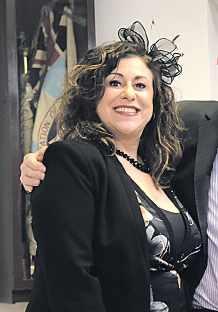
Southern of the London Food Therapy says
Southern of the London Food Therapy says the most helpful thing people can do is stop eating early in the evening. “Eating within a 10-hour window gives your body a long time to use up all the sugars and not store them as fat.”
Meanwhile high sugar, ultra-processed foods have a detrimental impact on weight, satiety and cravings and disrupt your blood sugar, Laura explains. “Replace them with good fats such as nuts, seeds, avocado and olive oil which make you feel full.”


Laura also recommends filling up on





protein and suggests plantbased versions including chickpeas and peas which are a source of fibre and fill you up, meaning you are less likely to have sugar cravings. “Make your diet as whole food-based and minimally processed as possible and eat three meals a day with no snacking. It will be slow progress, but it’s about making this change of lifestyle stick.”
based versions including meaning you are less likely to
thematchmaker.uk / @larabesbrode1
itssosimple.co.uk / @itssosimple_rs
londonfoodtherapy.com / @londonfoodtherapy)









There are many fish in the sea, but none like these on the shelf. The choicest cuts of tuna: deep, buttery, rose-colored, with a complex flavor and silky-smooth texture.This is not meant for a tuna salad, this is for an insalata di tonno.





















Business / Facing down the AI-prompted job challenge
With Candice Krieger candicekrieger@googlemail.com

Tom
Pauk, a
senior mentor at coaching business Finito, tells Candice Krieger that the AI revolution and shrinking schemes are locking candidates out
hought ghosting was just for dating? Think again. In today’s job market –arguably one of the toughest in modern times – ghosting is fast becoming the norm for young job seekers.
TGraduates, many with top degrees, are sending out hundreds of job applications, only to be met with stone cold radio silence. No rejections. No feedback. Just a disappearing act from prospective employers, in many cases even after securing an interview. And it’s not just disheartening, it’s damaging, says Tom Pauk, Finito Education’s senior mentor.
Founded by communications expert Ronel Lehmann in 2016, Finito is a coaching and mentoring business which supports first-time job hunters making the transition from education to employment, as well as established professionals seeking a career change.
Pauk, a former City lawyer, explains: “It’s a perfect storm. The traditional routes for newly-qualified grads to white-collar jobs are shrinking. It’s not just about having a first or upper class second degree, which 20 years ago would have been a shoe-in. This is the context we are working in and it’s very challenging. Unsurprisingly, this all leads to loss of morale and energy among candidates. Sadly, ghosting is now par for the course.”
Pauk’s own career path took him to Allen & Overy (now A&O Shearman) where he spent seven years before going in-house at Citigroup. He left the law in 2015 for a mid-life pivot into playwriting, to build a professional mentoring practice, and to volunteer in the areas of mental health, dementia and criminal justice.

Pauk. “No human is involved in the whole process. So not only are the applications generic and unauthentic, but they’re being filtered out by software before anyone reads them. Employers want authenticity. They can smell a ChatGPT cover letter a mile off.”
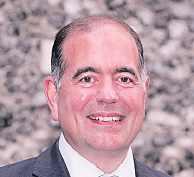
As Finito’s senior mentor, Pauk is passionate about helping young people. Finito, which also runs a bursary programme to support jobseekers, assists its candidates in trying to find their footing in a broken system.
So, what’s gone wrong? AI for starters. “Ironically, candidates are using AI to apply for jobs –then getting rejected by AI,” says
And the irony doesn’t end there. AI isn’t just rejecting candidates, it’s replacing them. “Much of what I did as a trainee lawyer is now done by AI. Firms simply don’t need the volume of junior hires anymore. That’s true not just in law, but in other professions including accountancy and HR, which have been hit particularly hard.”
Many major graduate schemes are contracting. According to reports, graduate roles have fallen to their “weakest level” since 2018.
KPMG, for instance, is said to have reduced its graduate cohort by 29 per cent, from 1,399 in 2023 to 942 last year, while Deloitte’s graduate recruitment has fallen by 18 per cent, with 1,700 graduates hired in 2023 compared with only 1,400 in 2024. EY and PwC have followed suit, reducing their graduate hiring
by 11 percent and six percent respectively.
Traditional whitecollar entry points are narrowing fast, yet graduate numbers remain high.
Unemployment is now at its highest level since the pandemic, climbing to 4.7 percent in the three months to May, marking the weakest labour market since mid-2021.

Beyond the numbers, Pauk is concerned about the emotional toll. “The constant rejection is extremely damaging for people’s self-esteem. Candidates are left questioning their worth. That’s why mentoring is so crucial right now. Not just for career strategy, but for mental resilience.”
Pauk has also returned to A&O Shearman in a mentoring capacity. Particularly passionate about mental health, Pauk is a shift supervisor at The Listening Place, a charity offering face-to-face support for those who feel life is no longer worth living. He is a trustee of the young offenders mentoring charity Trailblazers Mentoring, and has recently been appointed to the board of Cambridge Nightline, a new helpline that supports
students of Cambridge and Anglia Ruskin Universities. Pauk and Lehmann met at school, with their paths crossing several times since. Prior to launching Finito, Lehmann had a distinguished career in the City with stints as a recruitment consultant, stockbroker and public relations adviser with the IPS Group, Citicorp Scrimgeour Vickers, McAvoy Wreford Bayley and Citigate Dewe Rogerson, before setting up his eponymous marketing agency, which he ran for 26 years.
Lehmann frequently appears in the news and as a media commentator. During lockdown, he launched Finito World magazine and The Employability News Channel.
While the average Finito mentee is between 21 and 25, the fastestgrowing demographics are in their 30s, 40s and even 50s. “We’re seeing candidates who haven’t interviewed since their 20s. Maybe their roles have been made redundant, or they’ve hit a point in life where they’re asking: is there more than this?”
Rather than finding a like-forlike replacement job, Pauk says that some senior candidates are recalibrating - pursuing nonexecutive director roles, charity trusteeships or portfolio careers with greater purpose.
“The idea of a job for life is gone,” says Pauk. “Young people in particular are waking up to this. They value work-life balance. They’re willing to leave a job to go travelling, or switch paths entirely. And that’s a good thing.”
Pauk’s advice for job seekers:
Focus on fewer applications: Make them authentic and in close alignment with the employer’s stated mission and values
Use cover letters wisely: Use them to explain why you’re a good fit and recalibrate your CV for each job you apply for. Don’t just copy and paste!
Build resilience: Rejection will happen. Don’t take it personally Volunteer: Not just because it looks good on a CV but because it’s good for the soul.
Live a little: Travel. Meet people. Work different jobs. All of it builds experience and perspective.
Finito Success Stories
Aspiring lawyer Max Liebmann from Watford joined the Finito bursary programme in 2023, aged 19. At the time, Max was in his second year at the University of Cambridge studying law. Finito mentors helped Max with LinkedIn training, his interview skills and to develop his legal thinking. Through the Finito bursary scheme, Max went on to secure work experience with Carter-Ruck and more recently was offered a training contract at top law firm Slaughter and May, starting this September.
Judith, who is based in London and Ireland, is a former C-suite at an S&P 500 global corporation. Through Finito, she is seeking a mid-career reset in order to accommodate her outside interests, including taking on non-executive directorships and pursuing her passion for long-distance open-water swimming. Having reached the top of her profession, Finito is helping Judith to find that elusive work life balance.























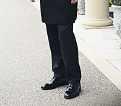








In our thought-provoking series, rabbis, rebbetzins and educators relate the week’s parsha to the way we live today

BY RABBI ARIEL ABEL SOLICITOR AND ARMY CHAPLAIN
This week’s Torah portion, Ki Teitzei, o ers timeless ethical lessons that speak directly to current debates in Britain.
The portion opens with an unsettling theme: the treatment of a woman captured in wartime. In an ancient world where sexual violence was weaponised, the Torah declares an injunction which sought at that time to try to prevent hostage-taking and rape of women captives.
Earlier this year a new record was set in the backlog of cases of sexual violence in the Crown Court; this passage feels acutely relevant in the light of this sad reality. At the heart of the matter lies the question: how do we restrain those with power from exploiting those without or with less power? In examining these themes, a trend is set by the Torah which needs updated

application deep into the future – our future.
After this topic Ki Teitzei moves through a diverse collection of mitzvot. Some are practical, such as inheritance rights, obligations to rebellious children and the requirement to build rooftop safety railings – an ancient form of health and safety legislation. Others speak to human compassion: forbidding cruelty to animals, ensuring fair treatment of workers and protecting debtors from predatory lenders.
The section on a mamzer - a child born of an adulterous or incestuous relationship – is, theologically, very di cult to comprehend. The Torah places severe restrictions on whom such a child may marry: these are practically a disincentive to bear or father children at all. The rationale was deterrence: to warn adults against engaging in illicit unions, by considering consequences for future generations. But the child is the one to bear social damnation for the sins of their parent, even though the Torah proclaims children should not su er for


Talented and inspirational Jewish Studies and Hebrew teachers required for our High School section (Grade 6-12) and our Elementary section (Kindergarten-Grade 5) to commence August 2026.
Carmel School Hong Kong, a Jewish International School is seeking teachers with:
BA or above in relevant studies, with a recognised teaching diploma.
Minimum two years relevant teaching experience in Hebrew and Jewish studies in Primary and/or Secondary schools.
Knowledge of IB PYP and MYP curricula is an asset.
Excellent classroom management skills.
Interest and experience in informal education.
Why Carmel School?
Carmel School is the only Jewish Through School in Asia, with over 370 students from 1 to 18 years old. Carmel School is accredited by WASC and the IB, offering the DP, MYP, and PYP. Our students graduate with impressive academic results and enter top universities around the world.
Carmel School is a cornerstone of Hong Kong's Jewish community with strong interpersonal relationships, an enviable working environment and a high teacher: student ratio. The School offers career progression, professional development and an attractive remuneration package to talented candidates.
parent’s misdeeds. The sages sought to soften the law by elevating learning above lineage: a mamzer who is a Torah scholar, they taught, deserves more honour than an ignorant priest.
This tension between inherited disadvantage and social inclusion speaks directly to current national debates. Whether discussing child poverty, treatment of refugees, or impact of parental debts on families, Britain today still struggles with how far the consequences of one generation should fall on the next.
Other passages read like a bill of rights. Workers must be paid promptly. Runaway slaves are not to be returned to abusive masters. No exploitative interest on loans. Marriage and divorce are regulated to protect both individuals and the community; these commandments remind us that social and economic justice has always been central to Jewish teaching.
The reading ends by warning about Amalek, a nation that preyed on the vulnerable and attacked from behind. Jewish memory links

Amalek to regimes that target the weak – such as Nazi Germany with its extermination of the disabled and defenceless. In an era of rising hate and debates about how to protect minorities, Amalek remains more than an ancient foe; it is a symbol of cruelty we must constantly resist.
Ki Teitzei is not merely a list of ancient laws. It is a mirror held up to every generation, asking how we treat women, children, workers and strangers – and whether we are prepared to defend the vulnerable from those who would harm them.
This is a prophetic social ethic, as Jeremiah states: “For the Lord has redeemed Jacob and delivered him from the hand of the one stronger than him!” Always be there to defend others, as you would have others do for you.

Programme and Service Manager (Advice Triage)
£55,544 – £61,000 | 35 hrs (28 hrs considered) Two Year Fixed Term | Hendon | Hybrid working
Norwood is recruiting a Programme and Service Manager to lead our new Community Advice Triage Service (Open Front Door), a flagship access point for families, professionals and community partners. This leadership role will oversee the launch, growth and delivery of the service, building and managing a dedicated team, aligning referral pathways, and working with partners across the Jewish community and statutory sectors.
We’re looking for a proven leader with experience in social care, education or advice services or project management and excellent stakeholder skills. This is a unique opportunity to shape an innovative model that puts accessibility, clarity and cultural sensitivity at the centre of family support.
Closing date: Friday 19 September 2025
Interviews: 29–30 September 2025
Apply: norwood.org.uk/careers


BY RABBI IGOR ZINKOV
THE LIBERAL JEWISH SYNAGOGUE
Like many others, I watched the video of a recent London rally for Israeli hostages, in which two of my rabbinic colleagues were told to leave the stage. Much has already been written about that painful moment. My point is di erent.
When I watched the rabbis being booed, something caught my eye. A group in yellow Stop the Hate t-shirts climbed on stage. Among them was a woman wearing large, cross-shaped earrings, an expression of her Christian faith.
Stop the Hate is not a Christian organisation; it is a Jewish-led group, though it clearly draws visible support from Christian allies. Seeing this mix, in such a charged Jewish setting, made me pause and reflect. What happens when Jewish



causes, especially those tied to Israel, become closely linked with Christian Zionist groups?
Like any religious group, Christian Zionists are diverse. Some simply support Israel out of political conviction. Many people don’t think of theology when they go to protests.
Others, however, are shaped by a religious vision rooted in 19th-century dispensationalism, popularised by John Nelson Darby and the Scofield Reference Bible, a work nearly 150 years old but treated by some as authoritative.
In this view, the Jewish return to the Land is part of a divine plan leading to the return of Jesus. The logic is simple: Jews in the Land = prophecy fulfilled = one step closer to Jesus’ return. Whether Jews are expected to “know Jesus” before or after that moment, the conviction is it will happen.
Meanwhile, many o er strong expressions of solidarity, claiming it is unconditional, though sometimes with the hope it will draw Jews toward Christian claims. It seems to me that for some, Jewish people are no more than pieces on a chessboard in their Christian game, not people
with our covenant, agency, and destiny. From within Christianity, such eschatological beliefs may be seen as a theological theory, no stranger than Judaism’s own hope for the messianic age.
The issue is not the existence of messianic expectations but how those beliefs, in certain contexts, are turned into political demands.
That is where the potential challenge to Jewish–Christian relations lies: sometimes theology crosses over into pressure on Jewish political life.
Some Christian Zionists, particularly those who read biblical prophecy literally, treat ancient texts as political blueprints for modern Israel. This can translate into rigid positions on borders, sovereignty, and settlement expansion.
And here is where support can start to feel conditional: if a Jew does not align with that theology and its political application, they may no longer be seen as the “right” kind of Jew.
Applause can turn quickly to hostility, as we saw at the rally.
Interfaith cooperation can be very worthwhile, and many Christian friends of Israel
A stimulating series where our progressive rabbis consider Judaism in the face of 21stcentury issues
have no interest in proselytising. But we must still ask: what happens to Jewish selfdetermination when outside theological goals influence our political direction?
Can the full spectrum of Jewish opinion be voiced if allies have hard-line expectations? How do we gratefully accept and welcome solidarity without allowing someone else’s narrative to define ours?
I do not doubt many Christians sincerely believe their love for Jews and Israel is without condition. Yet history warns us to be cautious. For some, when the hoped-for conversion does not come, a ection can turn to rejection.
Martin Luther is the most obvious example. In his youth, he wrote positively about Jews, hoping they would embrace his reform. When that did not happen, his writings turned bitter and hostile.
Alliances must be entered with eyes open. Friendship can be honoured and support welcomed, but the integrity of our voice, our values, and our own vision of Jewish life must remain ours to debate and define.














Jewish News is delighted to be entering a digital-first era with the launch of a new website and new regular glossy magazine. We are therefore seeking an enthusiastic, emerging sales force to help navigate this new era and to sell these exciting new products alongside opportunities with our portfolio of events and community-leading social media presence.
• Achieving personal and team sales targets. Working to the teams agreed yield and series framework.
• Championing digital first solutions with a particular focus on substantially growing New Business.
• Building and developing strong client relationships and attending meetings and events.
• Identifying revenue opportunities from new and existing accounts and selling solution based integrated campaigns.
• Successfully communicating and introducing digital campaigns to existing print clients.
• Effectively selling across the website, digital publications, social, newsletters, magazines and more.
• Working closely with the Jewish News Publishing and Editorial team to ensure a smooth and commercially successful relationship.
• Working with the Social Team to sell and implement new parthership content.
• Liaise with the Head of Finance to ensure all revenue is accurately reported and invoiced.
• SALARY: Approx 36k plus generous commission package but flexible depending on experience
Email a brief paragraph about yourself (and attach your CV) to Richard Ferrer
Kessler Jo, MBE, JP.
Passed away peacefully in the early hours of Shabbat, Friday August 29th.
Greatly beloved mother, mother-in-law, grandmother, great-grandmother, aunt, and cousin. She will be deeply missed by family, friends and colleagues around the UK.
ANTIQUES
Antique – Reproduction – Retro Furniture (any condition)
Epstein, Archie Shine, Hille, G Plan, etc.
Dining Suites, Lounges Suites, Bookcases, Desks, Cabinets, Mirrors, Lights, etc.
House clearances
Single items to complete homes
MARYLEBONE ANTIQUES - 8 CHURCH STREET NW8 8ED 07866 614 744 (ANYTIME) 0207 723 7415 (SHOP)
closed Sunday & Monday
STUART SHUSTER - e-mail - info@maryleboneantiques.co.uk
MAKE SURE YOU CONTACT US BEFORE SELLING






Confidential Bereavement Counselling for adults and children individually. Support Groups available. We offer in person, online and telephone counselling. Contact Jewish Bereavement Counselling Service in confidence. 0208 951 3881 enquiries@jbcs.org.uk | www.jbcs.org.uk
Call our Legacy Team on 020






















Jewish News presents





Bar & Batmitzvah show 11AM to 4PM SUNDAY 2025 NOV 30




Village Hotel, Centennial Park, Elstree, WD6 3SB






Spend your retirement doing what you lovenot worrying about money.


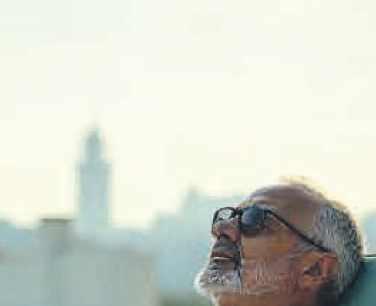
could help you unlock the value of your home, giving you the freedom to retire in comfort, travel freely, support your family, or





simply relax and remove . means-tested


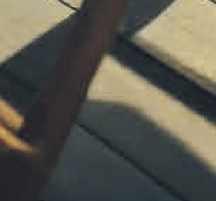











Britain is losing its soul and losing the plot.
The authorities have been appeasing extremists and bigots, letting them radicalise our children and run rampant on our streets and campuses, while arresting those who stand up against them.
Recent scenes from Glastonbury, broadcast into the homes of millions by our taxpayer-funded BBC, were a turning point.
Join us on Sunday 7th September in London for Britain’s March Against Antisemitism.
This must be the moment that the country wakes up. People need to see that they are not alone in feeling this way and the authorities need to see it too.
That is why we must stand together. Join us.
March sets off at 13:00 on Sunday 7th September.
Gather at the corner of Hallam Street and Weymouth Street Marylebone, W1W 6JJ.
